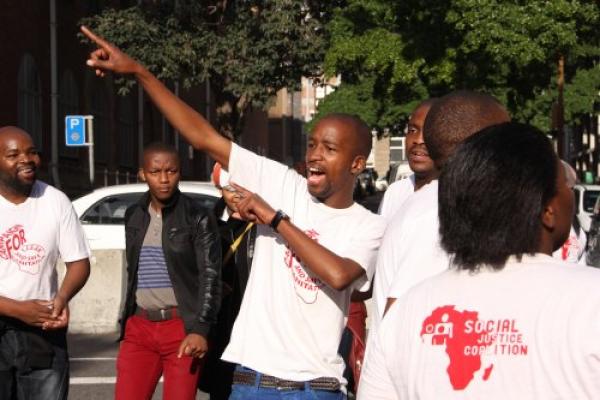Cape Town’s protest permit system not supported by law, says City employee

The City of Cape Town’s policy that requires groups, marchers and protesters to apply for a gathering permit is not supported by law. This was a concession made by one of the City’s own officials, Noel da Silva, who is employed to consider such applications and to grant permits.
Today, Da Silva was the first to testify in the trial of 21 Social Justice Coalition (SJC) activists, who were arrested for protesting outside the Civic Centre in September last year. The trial started in the Cape Town Magistrates’ Court today.
Under cross examination from the activists’ lawyer, Advocate Michael Bishop, Da Silva said that the Regulation of Gatherings Act (RGA) merely required that groups give the municipal authorities notice of intent to gather. Da Silva acknowledged that there is no explicit requirement in the RGA that permits need to be given and that the City’s policy which requires this needs to be addressed.
The 21 accused are charged with unlawfully convening and attending a protest gathering without giving the City of Cape Town prior notice, as is required by the Regulation of Gatherings Act (RGA). In their affidavit to the court, the activists acknowledged that they convened and attended the gathering, yet they all entered pleas of “not guilty” to the two charges.
The defence will argue that criminalisation of convening and attending a gathering without notice is unconstitutional and that this renders the RGA invalid.
On 11 September 2013 between 20 and 40 activists from the SJC staged an unannounced protest outside the Civic Centre, which houses the offices of Mayor Patricia de Lille. A statement issued by the SJC announced that fifteen of their members would “chain” themselves outside De Lille’s office.
“It is with a heavy heart that the SJC has been left with little alternative but to take this form of action,” read the statement.
“We are driven by the unrelenting broken promises and ongoing intransigence of Mayor de Lille – on the matter of the janitorial service in particular and the crisis of sanitation facing the City’s informal settlements more generally.”
The SJC chained themselves together across the stairs leading to the Civic Centre’s main entrance, which discouraged staff and visitors to the building from using that entrance/exit. Police officers arriving on the scene twice asked them to disperse. Eventually they arrested 21 people.
The second witness to take the stand was Warrant Officer Jacob Pietersen, who was present at the gathering and personally arrested two women. Pietersen gave his account of the protest and arrest, after which he was cross-examined by Bishop. Bishop accused him of exaggerating the size of the protest and the effectiveness of the “human chain” in preventing people from accessing or leaving the Civic Centre. Pietersen however stood by his original account.
The trial, which has been set down for two days, continues tomorrow at 11am.
Next: Fleeced! How Ellerines and African Bank misled a customer into debt
Previous: Makhaza’s shoddily built houses

This article is licensed under a Creative Commons Attribution-NoDerivatives 4.0 International License.


